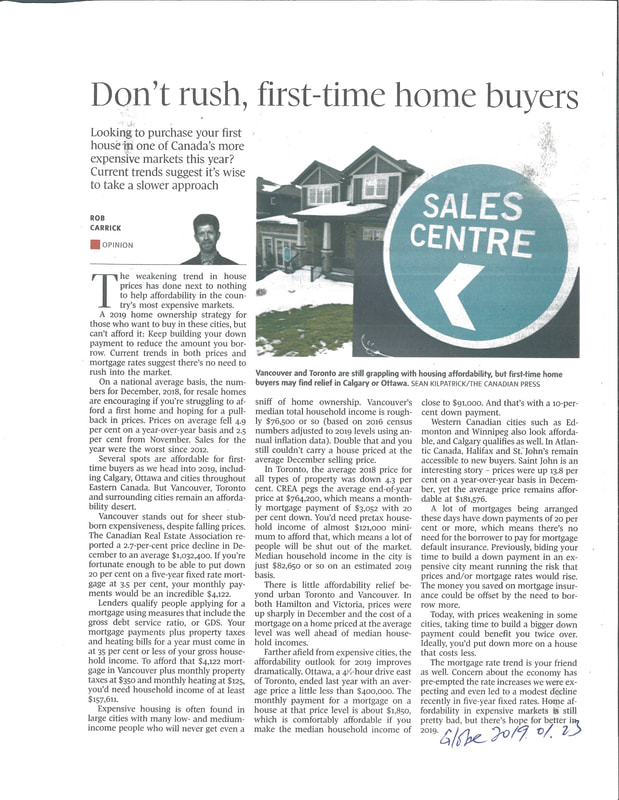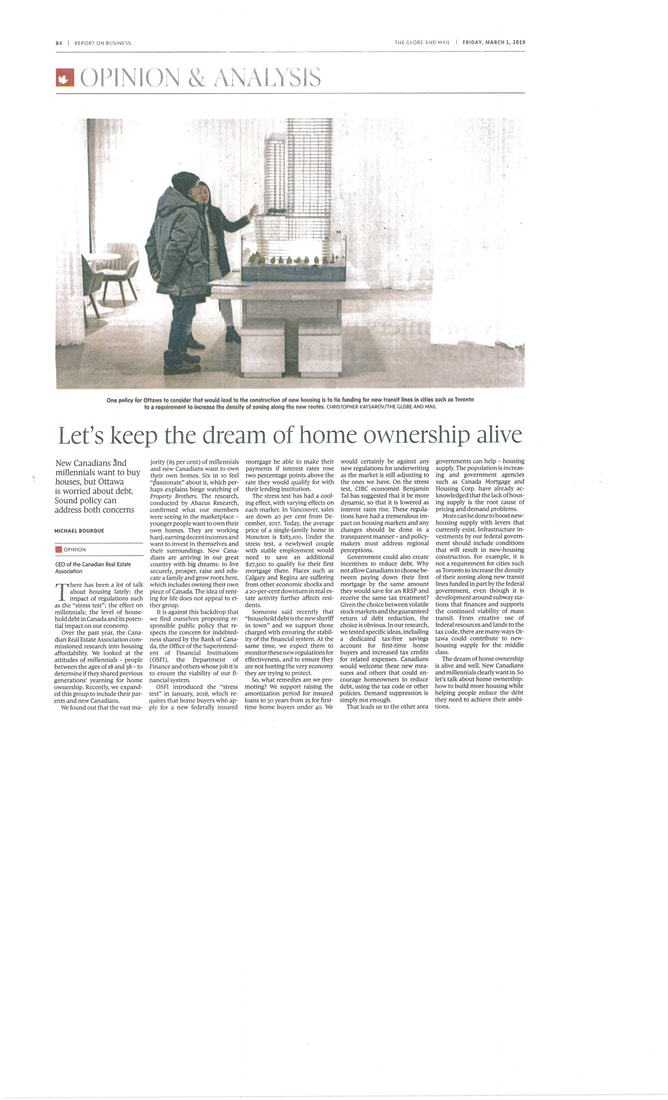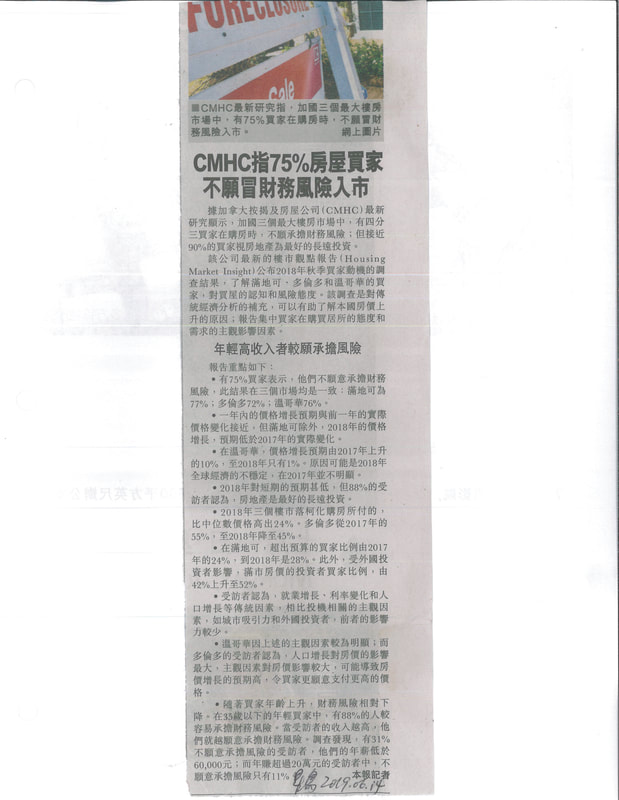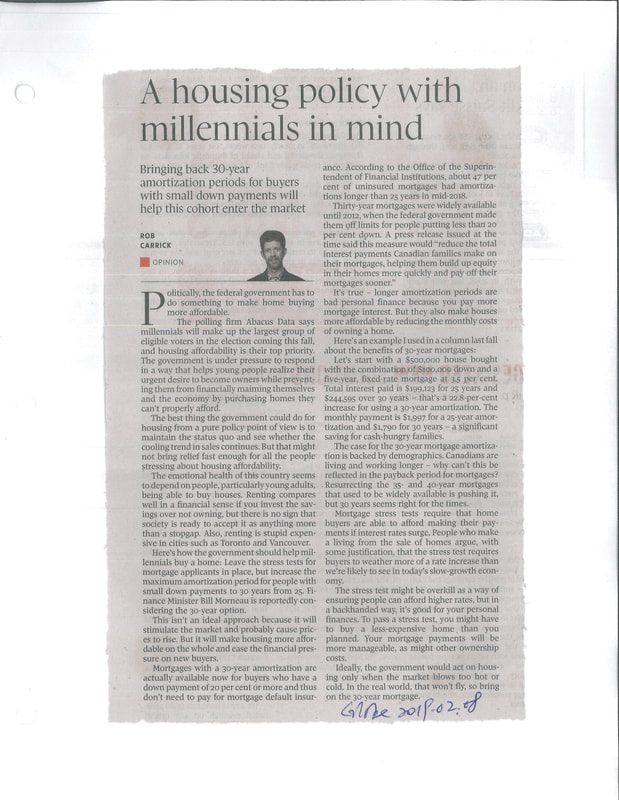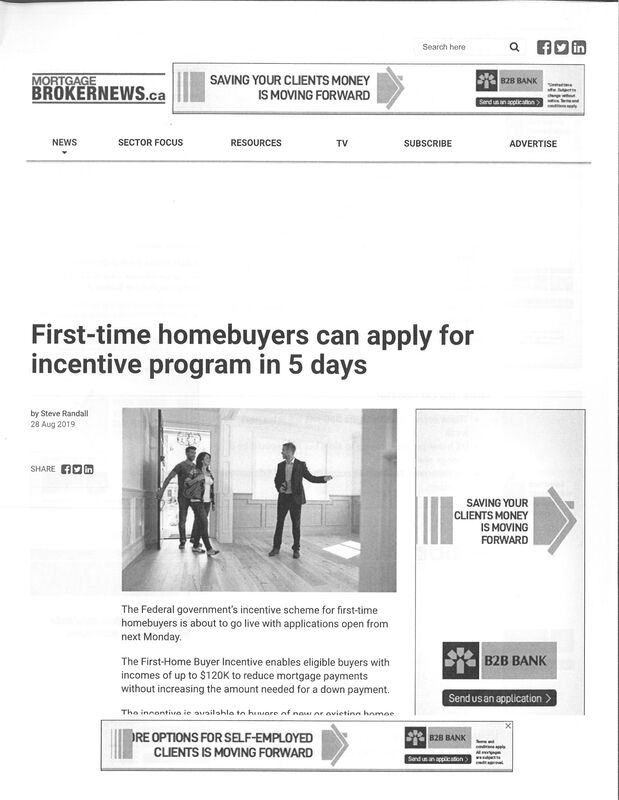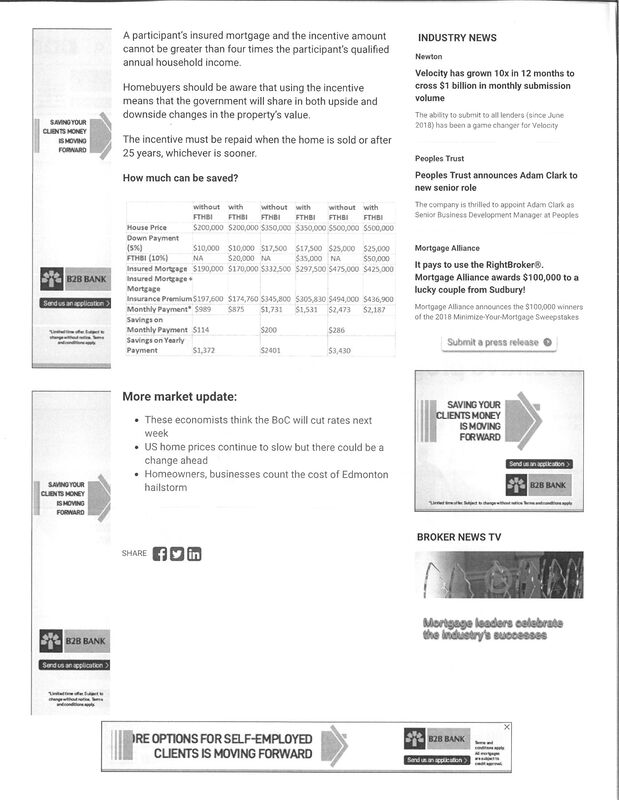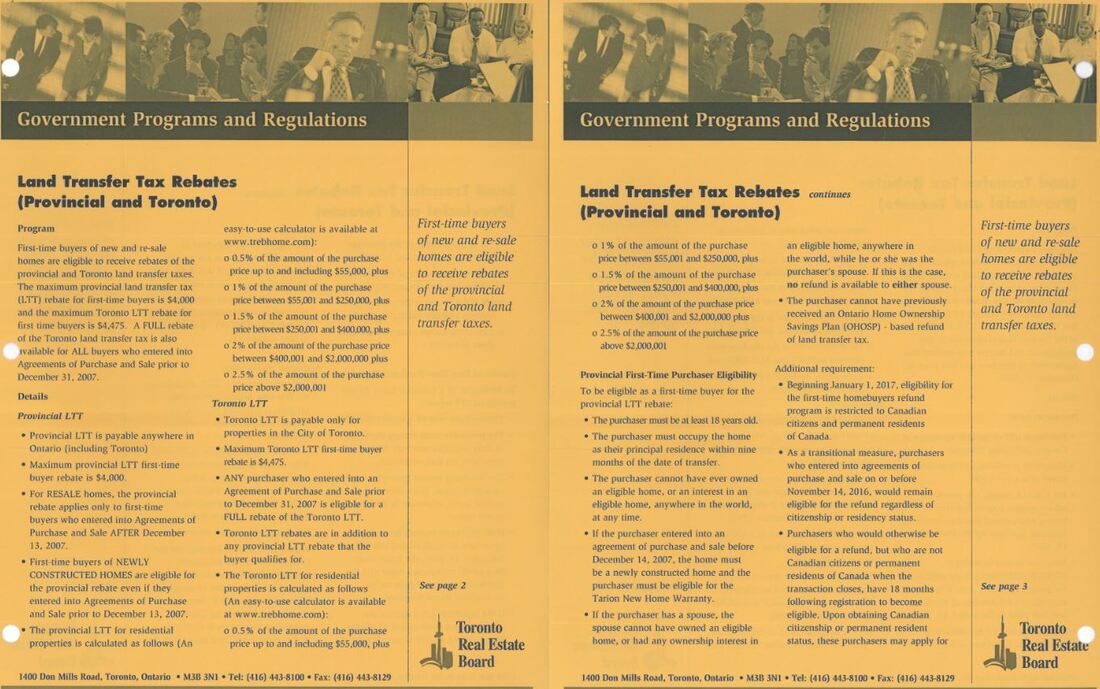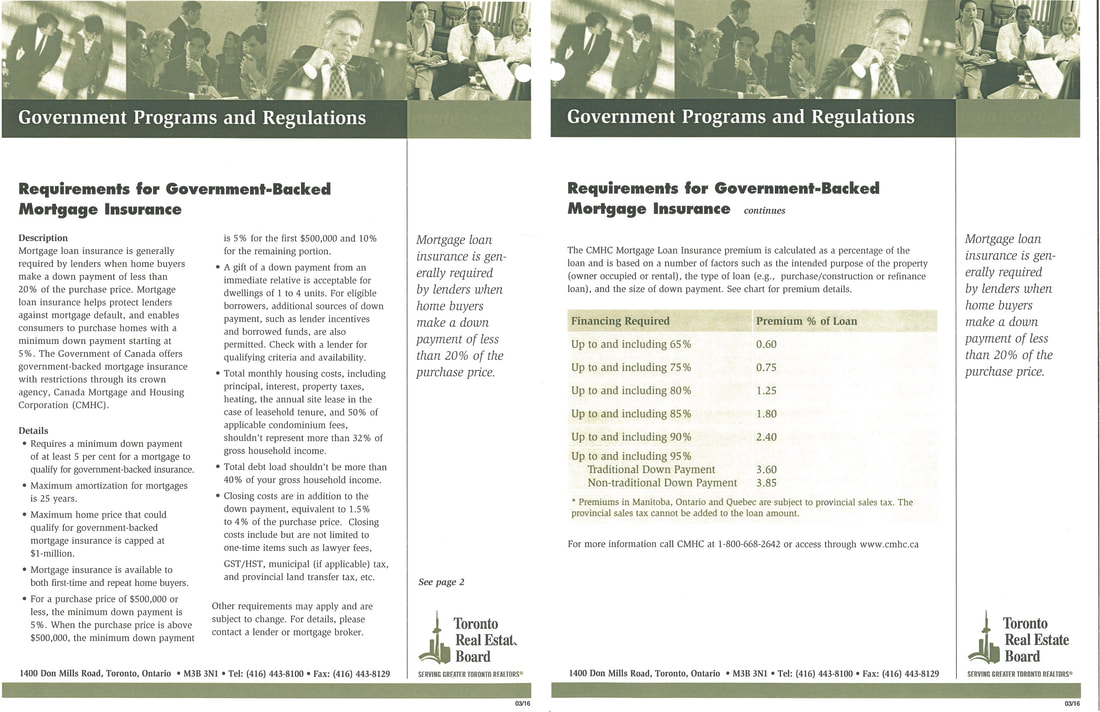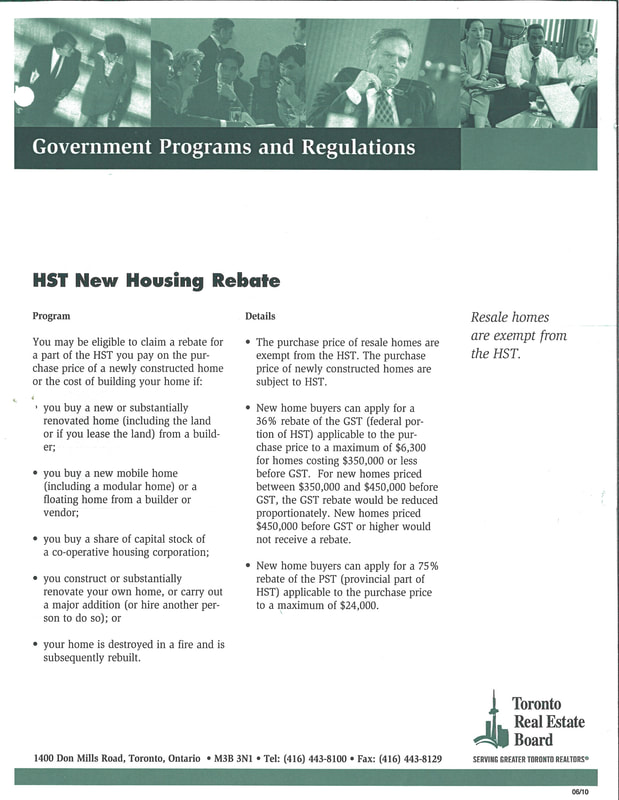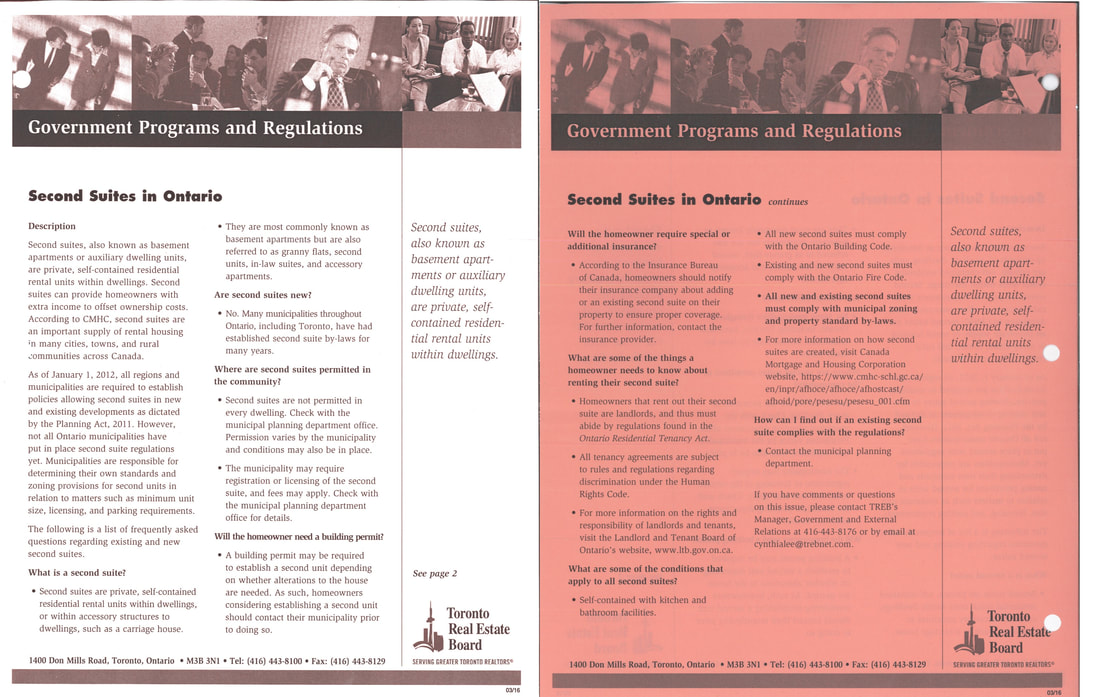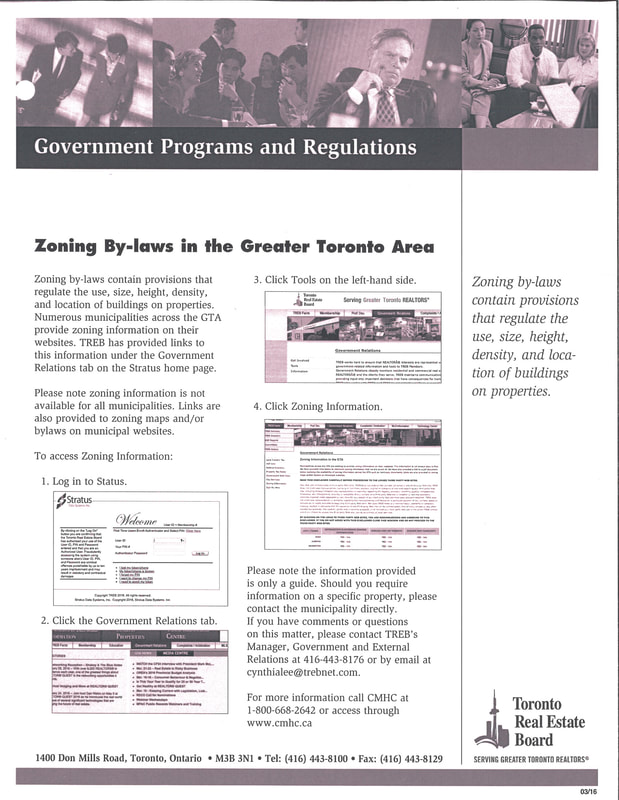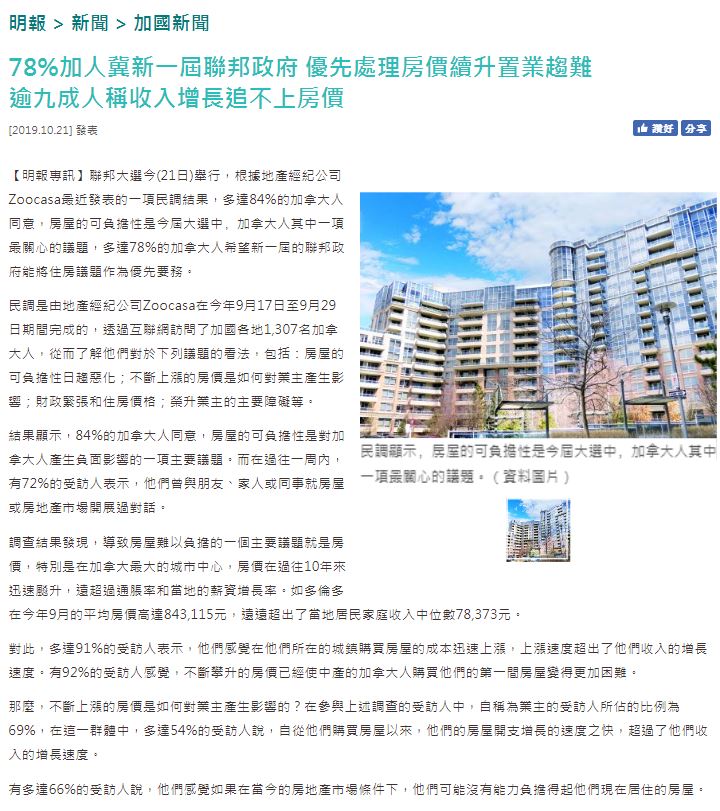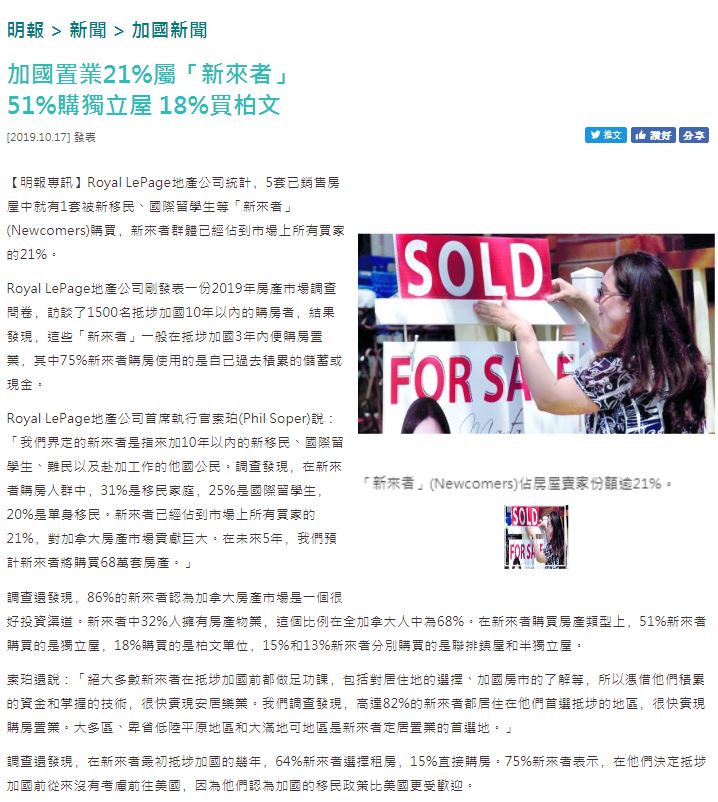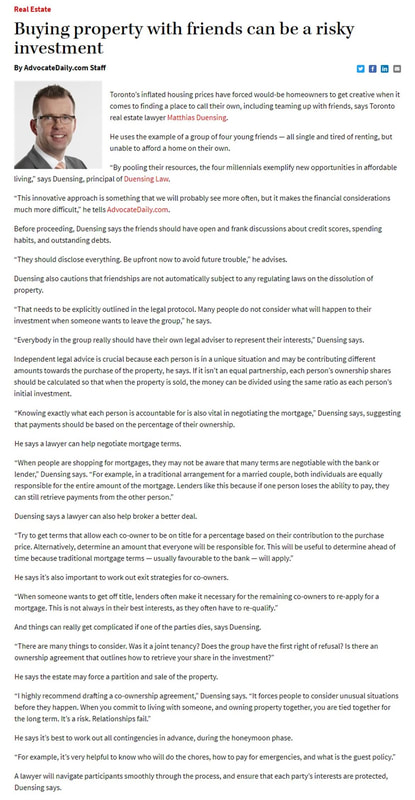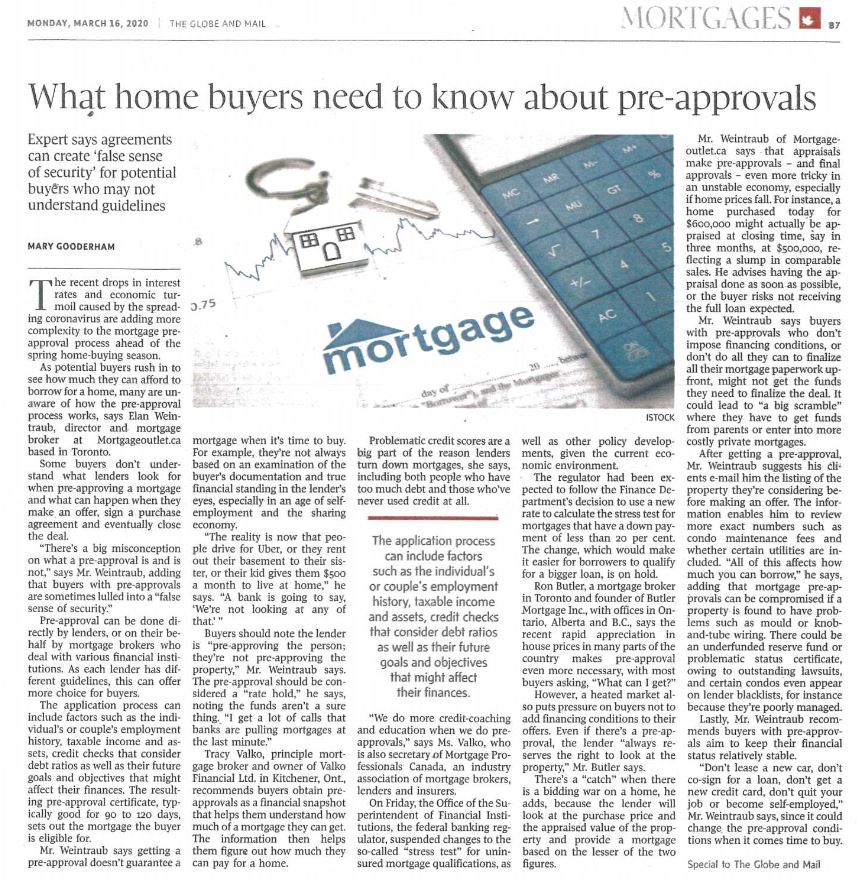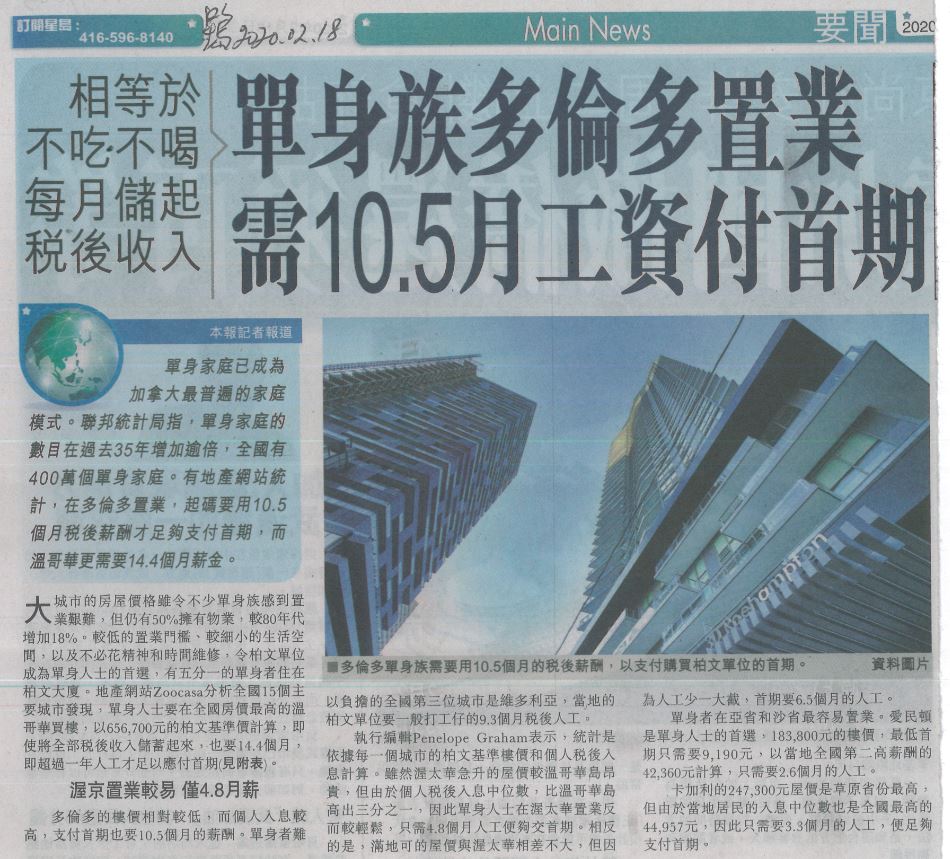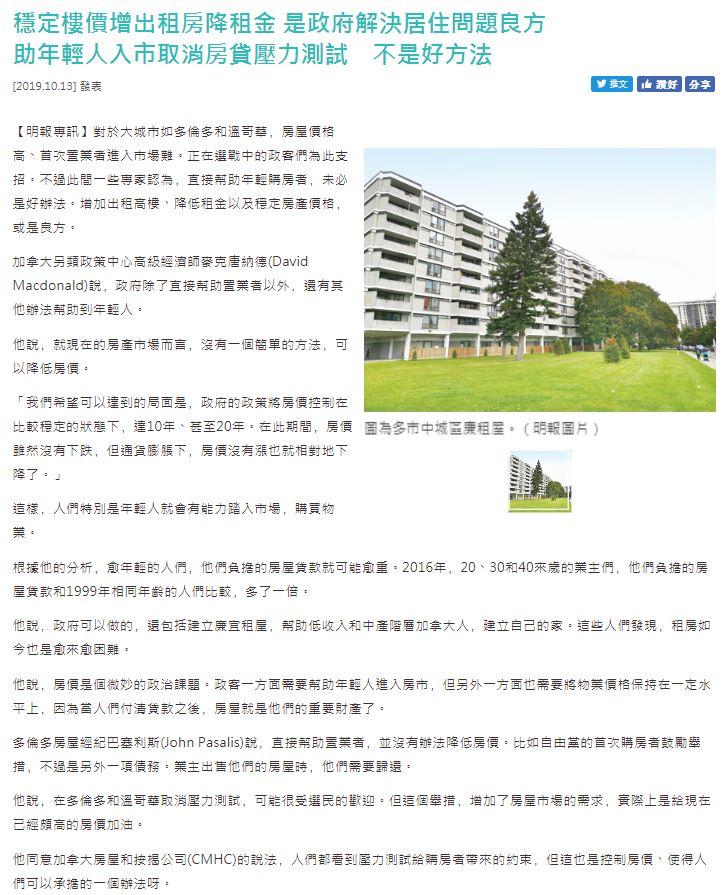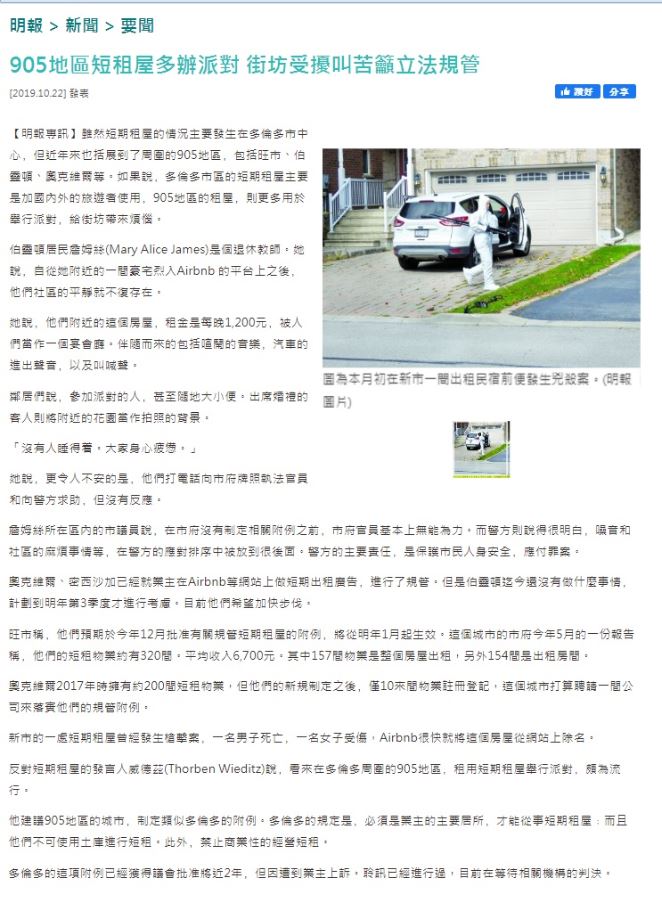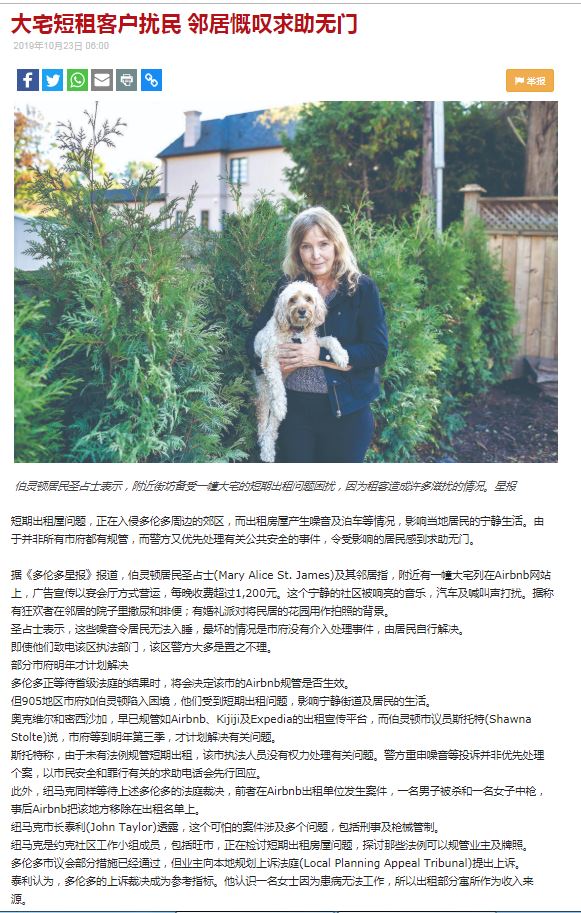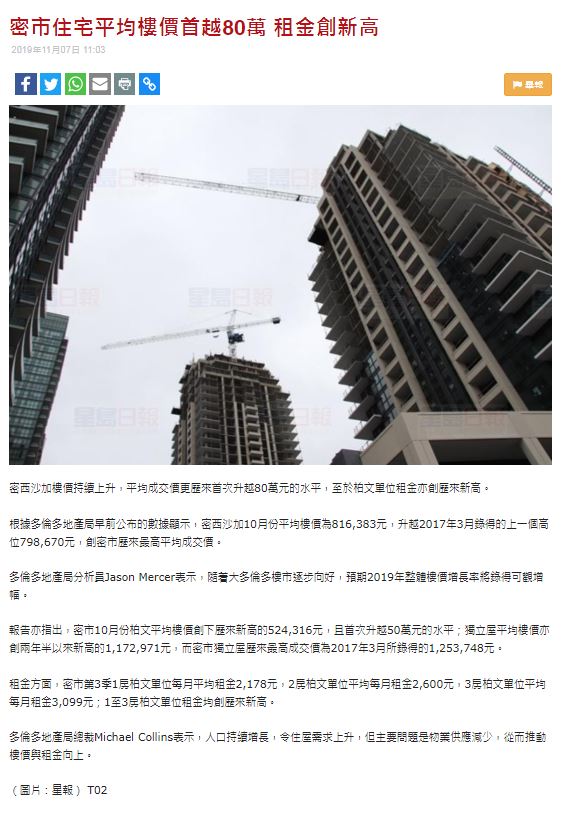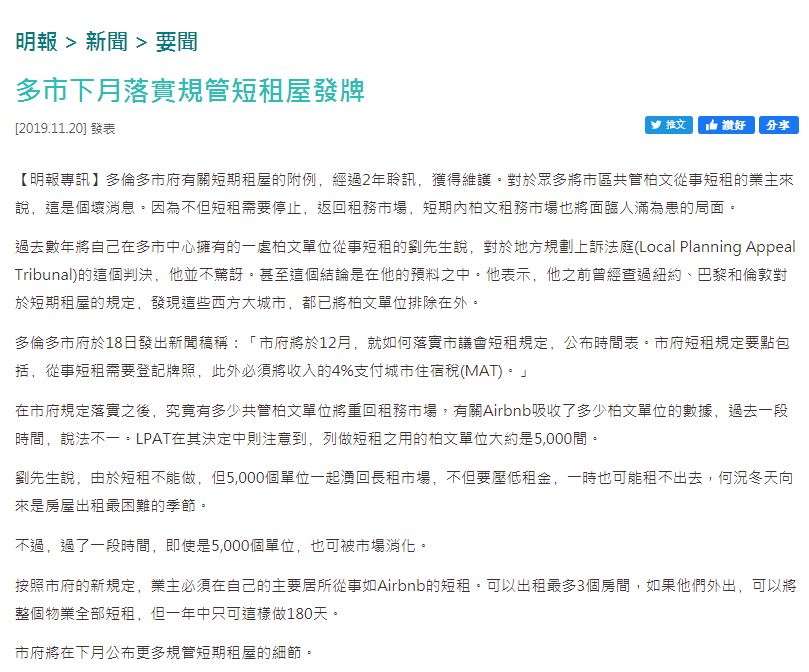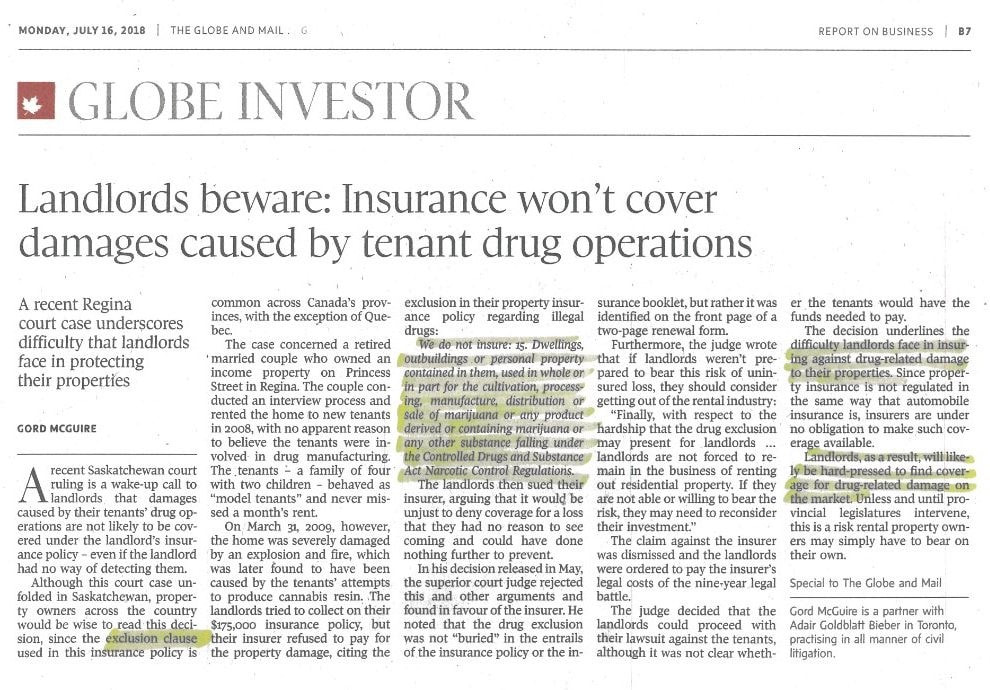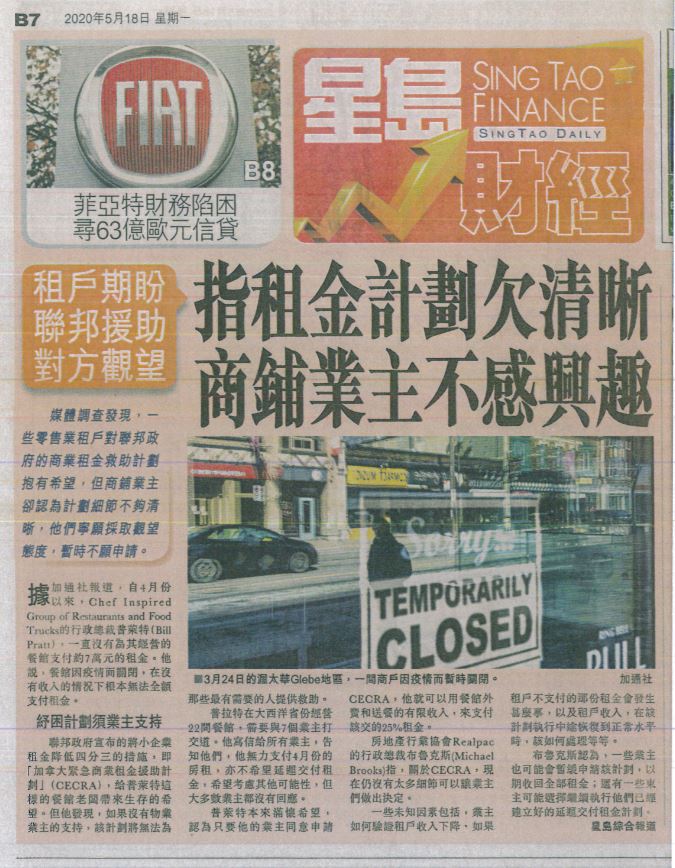INTERNATIONAL BUYER:Hong Kong investors eye Canada(2019.07.26)
As protests continue to rock Hong Kong, real estate brokers in Canada and the U.K. are fielding a flood of inquiries from investors in the former British colony who are eager to get out.
Dan Scarrow, president of Macdonald Real Estate Group in Vancouver, said many of his Chinese agents saw an uptick in interest for both sales and rentals this month from Hong Kong.
One of his agents is putting off her planned retirement this year to capitalize on the opportunity.
Before, it was usually a ratio of five mainland Chinese to one Hong Kong buyer coming to open houses, he said. “It has completely flipped now,” Scarrow said.
People have begun scouting for properties in cities including Toronto, Vancouver and London, England, as the unease surrounding Hong Kong’s political future grows amid China’s increasing influence. A drop in residential property prices is making some of these cities attractive. “Hong Kong money could become a major source of capital,” said David Ho, a broker at CBRE Ltd. who deals with Asian investments.
A look at few of the markets that are of interest to the Hong Kong buyers:
Vancouver’s advantage Vancouver, where housing prices have been in a slump for the past year, may be the first city to benefit from the upheaval in Hong Kong. Changes in Vancouver tax laws have pushed property prices lower since 2018, Knight Frank LLP said in a report, adding that investors will also benefit from currency-adjusted discounts of 17 per cent over the last year. Luxury homes were hit hardest by property tax changes causing the price of mansions to fall in the last few months leading to more incentives for buyers. With the city being home to a large Asian population, Vancouver is an appealing choice for many Hong Kong buyers.
“The tsunami tide of capital coming overseas in the last 10 years displaced a lot of old Hong Kong money,” CBRE’s Ho said. “Now, Hong Kong capital is looking at the price correction in Vancouver as an opportunity to get back in the market.”
Toronto boom Ho’s team is working on more than $400 million worth of potential deals for the likes of high-net worth individuals and publicly listed companies who want stability and attractive yields from the city’s real estate boom.
Canada’s biggest city Toronto is emerging as a popular choice for commercial and residential property investors given the strength of its housing market, which is partly driven by growth in technology and financial services industries. A weaker Canadian dollar may also mean attractive yields on some deals.
Brexit discounts Demand for the top 5 per cent most expensive London residential properties has surged from Hong Kong this year, representing about 6 per cent of all prospective purchasers registering in the market, according to Knight Frank. Investment from Hong Kong is bound to grow in the next12 months as more clarity around Brexit emerges, the property consultancy firm said.
Dan Scarrow, president of Macdonald Real Estate Group in Vancouver, said many of his Chinese agents saw an uptick in interest for both sales and rentals this month from Hong Kong.
One of his agents is putting off her planned retirement this year to capitalize on the opportunity.
Before, it was usually a ratio of five mainland Chinese to one Hong Kong buyer coming to open houses, he said. “It has completely flipped now,” Scarrow said.
People have begun scouting for properties in cities including Toronto, Vancouver and London, England, as the unease surrounding Hong Kong’s political future grows amid China’s increasing influence. A drop in residential property prices is making some of these cities attractive. “Hong Kong money could become a major source of capital,” said David Ho, a broker at CBRE Ltd. who deals with Asian investments.
A look at few of the markets that are of interest to the Hong Kong buyers:
Vancouver’s advantage Vancouver, where housing prices have been in a slump for the past year, may be the first city to benefit from the upheaval in Hong Kong. Changes in Vancouver tax laws have pushed property prices lower since 2018, Knight Frank LLP said in a report, adding that investors will also benefit from currency-adjusted discounts of 17 per cent over the last year. Luxury homes were hit hardest by property tax changes causing the price of mansions to fall in the last few months leading to more incentives for buyers. With the city being home to a large Asian population, Vancouver is an appealing choice for many Hong Kong buyers.
“The tsunami tide of capital coming overseas in the last 10 years displaced a lot of old Hong Kong money,” CBRE’s Ho said. “Now, Hong Kong capital is looking at the price correction in Vancouver as an opportunity to get back in the market.”
Toronto boom Ho’s team is working on more than $400 million worth of potential deals for the likes of high-net worth individuals and publicly listed companies who want stability and attractive yields from the city’s real estate boom.
Canada’s biggest city Toronto is emerging as a popular choice for commercial and residential property investors given the strength of its housing market, which is partly driven by growth in technology and financial services industries. A weaker Canadian dollar may also mean attractive yields on some deals.
Brexit discounts Demand for the top 5 per cent most expensive London residential properties has surged from Hong Kong this year, representing about 6 per cent of all prospective purchasers registering in the market, according to Knight Frank. Investment from Hong Kong is bound to grow in the next12 months as more clarity around Brexit emerges, the property consultancy firm said.
Paragraph. 按此處以編輯.
Paragraph. 按此處以編輯.
Paragraph. 按此處以編輯.
Paragraph. 按此處以編輯.
Paragraph. 按此處以編輯.
Paragraph. 按此處以編輯.
Paragraph. 按此處以編輯.
title 0
title 1
title 2
加國租金按年漲3.7% 安省升4.6%稱冠全加(2019.11.21)
【明報專訊】根據加拿大統計局最新發表的統計數據,加拿大在今年10月的租金較去年同期飈升了3.7%,漲幅之高創下了自1991年以來的最高歷史紀錄。至於安省的租金漲幅則達4.6%,位居加國各地租金漲幅的首位。
漲幅創1991年以來最高
加拿大統計局昨(20日)發表的統計數據顯示,在過往30年來,加拿大的租金開支在今年10月以最快的步伐上漲,顯示了私營投資在柏文興建領域的增長,未能緩解租金可負擔的問題。
統計數據顯示,綜觀加國各地在今年10月的租金漲幅,安省的租金漲幅達4.6%,超越了加國的平均水平。卑詩省和魁省的租金漲幅則接近全國平均水平。相比之下,加拿大在今年10月的通貨膨脹率只有1.9%。
加拿大的租屋市場一直存在可負擔性的問題,特別是在其最大的市場,需求超過了市場的供應。
出租單位空置率低至2.4%
據加拿大按揭及房屋公司(CMHC)發表的統計數據,在2018年,出租單位的空置率低至2.4%,與2017年的3%相比,進一步下跌。加拿大按揭及房屋公司將租屋市場需求增加的原因歸咎於加拿大吸納移民的人數增加。
隨着出租單位空置率的下跌,全加各地的租金均大幅上漲。以卑詩省的基隆那市(Kelowna)為例,當地一間兩睡房的柏文單位在2018年的平均租金﹐較2017年躍升了9.4%。在卑詩省的維多利亞和安省的彼得堡,當地一間兩睡房的柏文單位在2018年的平均租金較2017年攀升了7.6%。
而在安省的奧沙華,一間兩睡房的柏文單位在2018年的平均租金較2017年上漲了6.1%。
而在租屋市場供應短缺嚴重、出租單位空置率低至1%的多倫多和溫哥華地區,根據統計數據,多倫多一間兩睡房的柏文單位的月租高達2,400元,溫哥華一間兩睡房的柏文單位的月租則超過2,000元。
統計數據還顯示,加拿大有接近180萬租客的家庭將他們的稅前收入的超過30%花費在房租上。
鑑於租屋市場供應短缺的情況,在柏文興建領域的私營投資以前所未有的水平大幅增長。在2018年,出租單位的數量增長了接近5萬個,相當於過往10年平均增長率的一倍。
對此,加拿大另類政策研究中心(Canadian Centre for Policy Alternatives)的高級經濟學家麥克唐納(David MacDonald)指出,在近期興建的大量出租單位是豪華單位。
他說:「市場將為富人興建單位,我們還需要很多為中產階級新建的單位,他們在諸如多倫多和溫哥華等地工作和生活,但很可能無力負擔現有的租金水平。」(明报)
漲幅創1991年以來最高
加拿大統計局昨(20日)發表的統計數據顯示,在過往30年來,加拿大的租金開支在今年10月以最快的步伐上漲,顯示了私營投資在柏文興建領域的增長,未能緩解租金可負擔的問題。
統計數據顯示,綜觀加國各地在今年10月的租金漲幅,安省的租金漲幅達4.6%,超越了加國的平均水平。卑詩省和魁省的租金漲幅則接近全國平均水平。相比之下,加拿大在今年10月的通貨膨脹率只有1.9%。
加拿大的租屋市場一直存在可負擔性的問題,特別是在其最大的市場,需求超過了市場的供應。
出租單位空置率低至2.4%
據加拿大按揭及房屋公司(CMHC)發表的統計數據,在2018年,出租單位的空置率低至2.4%,與2017年的3%相比,進一步下跌。加拿大按揭及房屋公司將租屋市場需求增加的原因歸咎於加拿大吸納移民的人數增加。
隨着出租單位空置率的下跌,全加各地的租金均大幅上漲。以卑詩省的基隆那市(Kelowna)為例,當地一間兩睡房的柏文單位在2018年的平均租金﹐較2017年躍升了9.4%。在卑詩省的維多利亞和安省的彼得堡,當地一間兩睡房的柏文單位在2018年的平均租金較2017年攀升了7.6%。
而在安省的奧沙華,一間兩睡房的柏文單位在2018年的平均租金較2017年上漲了6.1%。
而在租屋市場供應短缺嚴重、出租單位空置率低至1%的多倫多和溫哥華地區,根據統計數據,多倫多一間兩睡房的柏文單位的月租高達2,400元,溫哥華一間兩睡房的柏文單位的月租則超過2,000元。
統計數據還顯示,加拿大有接近180萬租客的家庭將他們的稅前收入的超過30%花費在房租上。
鑑於租屋市場供應短缺的情況,在柏文興建領域的私營投資以前所未有的水平大幅增長。在2018年,出租單位的數量增長了接近5萬個,相當於過往10年平均增長率的一倍。
對此,加拿大另類政策研究中心(Canadian Centre for Policy Alternatives)的高級經濟學家麥克唐納(David MacDonald)指出,在近期興建的大量出租單位是豪華單位。
他說:「市場將為富人興建單位,我們還需要很多為中產階級新建的單位,他們在諸如多倫多和溫哥華等地工作和生活,但很可能無力負擔現有的租金水平。」(明报)
Ruling to limit Airbnbs ‘huge win for renters’(2019.11.19)
A provincial planning tribunal has rejected an appeal by Airbnb landlords and upheld the city’s short-term rental rules in a decision that is being touted as a “major victory for tenants.”
In his ruling, an adjudicator for the Local Planning Appeal Tribunal (LPAT) rejected landlords’ arguments that short-term rentals were just like any residential use of a home.
He said the city’s Airbnb regulations “represent a reasonable balancing ... ensuring that housing is provided for residents, that a full range of housing is available including short-term rentals, and that the business and tourism economies are supported.”
Toronto council approved the zoning bylaw amendments in December 2017. They were supposed to take effect in
June 2018 but were never enforced because of the appeal at the LPAT.
Under Toronto’s rules, short-term rentals would be allowed only in landlords’ principal residences for up to 180 nights a year for an entire house or apartment. Homeowners could also rent up to three bedrooms year round on a short-term basis — a term defined as less than 28 days.
Homeowners also wouldn’t be allowed to use basement apartments as shortterm rentals. Only the full-time resident of those suites could let those units for less than 28 days.
In a written decision Monday, the LPAT said the city’s approved rules have the potential to return up to 5,000 of Toronto’s more than 21,000 Airbnbs to the long-term residential market.
Those are the units where the property owners are not residing but rather using them exclusively as short-term rentals.
“Even if you return only 3,000, it’s a huge win for renters in Toronto,” said Thorben Wieditz of Fairbnb, a pro-regulation coalition of tenant advocates, community groups, academics and hoteliers that participated in the appeal process.
Mayor John Tory also praised the decision saying it strikes the right balance between allowing people to earn extra money through homesharing and ensuring the city’s rental housing isn’t depleted by tourist accommodation. “These changes do not prohibit short-term rentals but permits and regulates them in a manner that does not displace households. They also provide opportunities to meet the needs of residents and visitors requiring or preferring short-term rental accommodation in a residential setting,” he said in a statement.
It is not clear whether the landlords will appeal the decision or how long it will take the city to implement the new short-term rental regulations.
The landlords have 30 days to request a review of a decision from the associate chair of the LPAT or appeal to the Divisional Court. An appeal would be “unreasonable and a detriment for the public interest and a selfish thing to do if it comes from an individual host and not a very civic thing to do if it comes from the company,” Wieditz said.
LPAT adjudicator Scott Tousaw said the city’s zoning bylaw “has a solid basis and planning rationale” based on “consulting widely with industry and public stakeholders.”
He noted that homesharing, where someone rents a room in their house, and rentals for periods of longer than 28 days would still be allowed.
The tribunal agreed with the city and Fairbnb that secondary suites are intended to increase the city’s housing supply. The provincial policy encouraging basement apartments, “could not have been intended to provide for visitor or tourist accommodations,” Tousaw wrote.
During the appeal hearing, the tribunal heard from a lawyer for Alexis Leino, one of the landlords who launched the appeal. The lawyer raised the question of whether the city’s Airbnb restrictions might prompt some homeowners to rip out their secondary units or discourage their installation. Toronto has 2,138 legal secondary units, but it estimates there are 70,000 to 100,000 more that aren’t on the books as having the required fire and building code compliance.
The LPAT found the city’s record of Airbnb-related nuisance complaints was insufficient to prove that short-term rentals comes with noise, garbage and parking. Tousaw did, however, find “that the commercial characteristics of dedicated short-term rentals could have an effect on neighbourhood character.”
A city spokesperson said Toronto will move ahead with implementation, but it will be December before there’s more information on when the rules take effect. “While this ruling provides regulatory certainty for homesharing in Toronto, we continue to share our hosts’ concerns that these rules unfairly punish some responsible short-term rental hosts who are contributing to the local economy. We remain committed to working closely with the City of Toronto and the Airbnb community as these new rules are implemented. We encourage other platforms to also come to the table and support responsible homesharing in Toronto,” said a statement attributed to Alex Dagg, public policy manager for Airbnb Canada.
Airbnb is the biggest shortterm rental platform operating in the city, but it did not have formal standing at the appeal. Websites such as Expedia, VRBO and Kijiji compete with the company.
The city has a plan to enforce its rules through a licensing bylaw that would require landlords to register their rentals with the city and pay $50. Rental platforms would have to pay a one-time licence application fee of $5,000, plus $1 for each night booked through the company. Landlords would also be responsible for a four per cent Municipal Accommodation Tax on rentals that are less than 28 consecutive days.
A November 2017 report to the city’s Licensing and Standards Committee said bylaw enforcement was expected to cost $1.18 million for five fulltime staff and a one-time expense of $905,000 for three city workers to implement the bylaw. The ongoing cost of the program is supposed to be covered by the fees.
In his ruling, an adjudicator for the Local Planning Appeal Tribunal (LPAT) rejected landlords’ arguments that short-term rentals were just like any residential use of a home.
He said the city’s Airbnb regulations “represent a reasonable balancing ... ensuring that housing is provided for residents, that a full range of housing is available including short-term rentals, and that the business and tourism economies are supported.”
Toronto council approved the zoning bylaw amendments in December 2017. They were supposed to take effect in
June 2018 but were never enforced because of the appeal at the LPAT.
Under Toronto’s rules, short-term rentals would be allowed only in landlords’ principal residences for up to 180 nights a year for an entire house or apartment. Homeowners could also rent up to three bedrooms year round on a short-term basis — a term defined as less than 28 days.
Homeowners also wouldn’t be allowed to use basement apartments as shortterm rentals. Only the full-time resident of those suites could let those units for less than 28 days.
In a written decision Monday, the LPAT said the city’s approved rules have the potential to return up to 5,000 of Toronto’s more than 21,000 Airbnbs to the long-term residential market.
Those are the units where the property owners are not residing but rather using them exclusively as short-term rentals.
“Even if you return only 3,000, it’s a huge win for renters in Toronto,” said Thorben Wieditz of Fairbnb, a pro-regulation coalition of tenant advocates, community groups, academics and hoteliers that participated in the appeal process.
Mayor John Tory also praised the decision saying it strikes the right balance between allowing people to earn extra money through homesharing and ensuring the city’s rental housing isn’t depleted by tourist accommodation. “These changes do not prohibit short-term rentals but permits and regulates them in a manner that does not displace households. They also provide opportunities to meet the needs of residents and visitors requiring or preferring short-term rental accommodation in a residential setting,” he said in a statement.
It is not clear whether the landlords will appeal the decision or how long it will take the city to implement the new short-term rental regulations.
The landlords have 30 days to request a review of a decision from the associate chair of the LPAT or appeal to the Divisional Court. An appeal would be “unreasonable and a detriment for the public interest and a selfish thing to do if it comes from an individual host and not a very civic thing to do if it comes from the company,” Wieditz said.
LPAT adjudicator Scott Tousaw said the city’s zoning bylaw “has a solid basis and planning rationale” based on “consulting widely with industry and public stakeholders.”
He noted that homesharing, where someone rents a room in their house, and rentals for periods of longer than 28 days would still be allowed.
The tribunal agreed with the city and Fairbnb that secondary suites are intended to increase the city’s housing supply. The provincial policy encouraging basement apartments, “could not have been intended to provide for visitor or tourist accommodations,” Tousaw wrote.
During the appeal hearing, the tribunal heard from a lawyer for Alexis Leino, one of the landlords who launched the appeal. The lawyer raised the question of whether the city’s Airbnb restrictions might prompt some homeowners to rip out their secondary units or discourage their installation. Toronto has 2,138 legal secondary units, but it estimates there are 70,000 to 100,000 more that aren’t on the books as having the required fire and building code compliance.
The LPAT found the city’s record of Airbnb-related nuisance complaints was insufficient to prove that short-term rentals comes with noise, garbage and parking. Tousaw did, however, find “that the commercial characteristics of dedicated short-term rentals could have an effect on neighbourhood character.”
A city spokesperson said Toronto will move ahead with implementation, but it will be December before there’s more information on when the rules take effect. “While this ruling provides regulatory certainty for homesharing in Toronto, we continue to share our hosts’ concerns that these rules unfairly punish some responsible short-term rental hosts who are contributing to the local economy. We remain committed to working closely with the City of Toronto and the Airbnb community as these new rules are implemented. We encourage other platforms to also come to the table and support responsible homesharing in Toronto,” said a statement attributed to Alex Dagg, public policy manager for Airbnb Canada.
Airbnb is the biggest shortterm rental platform operating in the city, but it did not have formal standing at the appeal. Websites such as Expedia, VRBO and Kijiji compete with the company.
The city has a plan to enforce its rules through a licensing bylaw that would require landlords to register their rentals with the city and pay $50. Rental platforms would have to pay a one-time licence application fee of $5,000, plus $1 for each night booked through the company. Landlords would also be responsible for a four per cent Municipal Accommodation Tax on rentals that are less than 28 consecutive days.
A November 2017 report to the city’s Licensing and Standards Committee said bylaw enforcement was expected to cost $1.18 million for five fulltime staff and a one-time expense of $905,000 for three city workers to implement the bylaw. The ongoing cost of the program is supposed to be covered by the fees.
Evicted Ontario tenant challenges ‘draconian’ pot law as unconstitutional(2019.07.29)
TORONTO – A man evicted from his home and whose possessions were seized has launched a legal challenge to new Ontario legislation that aims to weed out illegal cannabis sales.
In an unproven application before Superior Court, Jeffrey Brodie argues the provisions enacted by the government of Premier Doug Ford this month are unconstitutional on several levels.
Key among the problems, Brodie argues, is that the law allows eviction of law-abiding tenants and the seizure of their belongings without due process. It also forces evicted tenants to prove their innocence.
“Notwithstanding that (Brodie’s) indication to the officers that his residential unit is a separate and distinct part of the building, the officers refused to allow (him) to re-enter the building,” the application states. “The applicant has been left without the basic human necessities, including housing.”
Brodie, 42, had lived for more than a year in an upstairs rental unit in a building police said was being used as an illegal marijuana dispensary. On July 9, officers and city officials raided the building. They entered his apartment without warning and ordered him out. Officers seized most everything in the unit. He has just a duffel bag with some clothes.
They charged the landlord for operating an illegal dispensary and barred re-entry to the building, with the law calling for a potential fine or jail time for doing so. Brodie was not charged.
“The seizure of the applicant’s property is unreasonable given that the applicant is not involved in the operation of the cannabis store and is not named as a party to the information or search warrant,” asserts his application filed by lawyer Selwyn Pieters.
The impugned legislation – part of the More Homes, More Choice Act – amended the Cannabis Control Act of 2017, which allows police to close a building used for illicit pot sales and remove the occupants. The amendment closed a loophole that barred officers from evicting residential tenants. It also precluded Superior Court judges from awarding costs to a person trying to get back their seized property.
“The amendment allows officers to remove tenants from a premises without any, or inadequate, legislatively mandated restraints, oversight, accountability and/or transparency,” the application states. “No consideration is given to the lawful nature of the tenant’s occupation of the premises.”
The “draconian” legislation is too sweeping and arbitrary, the notice asserts, and its application has caused Brodie serious physical, mental and emotional harm.
During legislative debate on the amendment, New Democrat Jeff Burch warned about the potential consequences of the law.
“Giving the ability for a family to be expelled from their home because a family member – or worse, a visitor – engages in an illegal activity is unthinkable,” Burch said in May.
Brodie, a painter, said he’s been sleeping on a park bench and has not been able to access his tools. The situation has left him in despair, he said.
Neither Attorney General Doug Downey nor Solicitor General Sylvia Jones responded to a request for comment. (Global News, Colin Perkel)
In an unproven application before Superior Court, Jeffrey Brodie argues the provisions enacted by the government of Premier Doug Ford this month are unconstitutional on several levels.
Key among the problems, Brodie argues, is that the law allows eviction of law-abiding tenants and the seizure of their belongings without due process. It also forces evicted tenants to prove their innocence.
“Notwithstanding that (Brodie’s) indication to the officers that his residential unit is a separate and distinct part of the building, the officers refused to allow (him) to re-enter the building,” the application states. “The applicant has been left without the basic human necessities, including housing.”
Brodie, 42, had lived for more than a year in an upstairs rental unit in a building police said was being used as an illegal marijuana dispensary. On July 9, officers and city officials raided the building. They entered his apartment without warning and ordered him out. Officers seized most everything in the unit. He has just a duffel bag with some clothes.
They charged the landlord for operating an illegal dispensary and barred re-entry to the building, with the law calling for a potential fine or jail time for doing so. Brodie was not charged.
“The seizure of the applicant’s property is unreasonable given that the applicant is not involved in the operation of the cannabis store and is not named as a party to the information or search warrant,” asserts his application filed by lawyer Selwyn Pieters.
The impugned legislation – part of the More Homes, More Choice Act – amended the Cannabis Control Act of 2017, which allows police to close a building used for illicit pot sales and remove the occupants. The amendment closed a loophole that barred officers from evicting residential tenants. It also precluded Superior Court judges from awarding costs to a person trying to get back their seized property.
“The amendment allows officers to remove tenants from a premises without any, or inadequate, legislatively mandated restraints, oversight, accountability and/or transparency,” the application states. “No consideration is given to the lawful nature of the tenant’s occupation of the premises.”
The “draconian” legislation is too sweeping and arbitrary, the notice asserts, and its application has caused Brodie serious physical, mental and emotional harm.
During legislative debate on the amendment, New Democrat Jeff Burch warned about the potential consequences of the law.
“Giving the ability for a family to be expelled from their home because a family member – or worse, a visitor – engages in an illegal activity is unthinkable,” Burch said in May.
Brodie, a painter, said he’s been sleeping on a park bench and has not been able to access his tools. The situation has left him in despair, he said.
Neither Attorney General Doug Downey nor Solicitor General Sylvia Jones responded to a request for comment. (Global News, Colin Perkel)
A primer on Airbnb hearings(2019.09.17)
The city says its short-term rental rules are about protecting Toronto’s housing supply and maintaining the stability of its beloved residential neighbourhoods — even the ones located in highrises.
Landlords say the rules restrict their property rights and income.
The two sides waited a year to put their cases before the province’s Local Planning Appeal Tribunal (LPAT). Adjudicator Scott Tousaw will decide whether the bylaw — originally supposed to take effect in June 2018 — ever goes into play.
It’s not clear when he will deliver a decision, but it will be after an Oct. 15 hearing in which summary arguments will be presented by lawyers representing the city, the landlords and the Fairbnb coalition — a group comprised of tenant advocates, hotel industry representatives, neighbourhood groups, residents and academics.
Here are some of the take-aways from the first eight days of hearings that took place in August and early September after a year’s delay.
Tenants are primary when it comes to secondary suites
Much of the tribunal was occupied with the bylaw’s restrictions on property owners’ ability to use legal secondary suites as short-term rentals.
Toronto has 2,138 legal secondary units. Built between 2002 and 2018, those are the suites for which the city has building permits on file.
When the Star questioned that number directly with the city, it found the legal units are dwarfed by the Toronto’s estimate of another 70,000 to 100,000 secondary suites built prior to amalgamation. Some of those complied with the building and fire codes of the time and are considered legal, but the city has “no consolidated records” of those. Others, built without permits, are considered illegal. Toronto has no record of those.
The city didn’t explain how it intends to stop homeowners from renting illegal secondary suites, only that it doesn’t want to be too explicit about enforcement because that would help people skirt the rules.
Those wanting to rent a secondary suite would be required to declare that it complies with zoning, building and fire codes when they register their unit with the pending licensing provisions. In an email to the Star, the city said it will verify that information if a consumer or enforcement agency complains.
The pending bylaw says the principal occupant of the legal secondary suite is the only one who can rent it on the shortterm market. That means the long-term tenant would have to register the property with the city before advertising it on a platform such as Airbnb. How much more does a landlord make from a shortterm rental than a long-term tenant?
Homeowner Desiree Narciso told the tribunal she can make 450 per cent more renting her basement on the short-term market than she could to a longterm tenant.
She said she rents the basement, which can be divided into a bachelor and a one-bedroom apartment, for between $90 and $160 a night per unit. She has an 80 to 90 per cent occupancy rate. Sometimes she rents the suites separately by closing a dividing door. Other times she lets the basement as one large unit.
Eighty per cent occupancy is about 24 nights a month. If she let the units out separately for that many nights at a maximum rent of $160 for the one-bedroom and $140 for the bachelor, Narciso would earn more than $7,000 a month from shortterm rentals in her basement.
She told the tribunal that she wouldn’t feel great about charging even $1,600 a month in rent to a long-term tenant for that space.
But, like everything in real estate, location is key. Narciso’s Queen St. W., neighbourhood is popular with tourists.
A little further off the beaten track, Alexis Leino rents the basement suite in his East York bungalow for about $80 a night. The Star found several apartment ads on Kijiji listed for about $1,300 a month in that area.
Given the cleaning, towels, sheets, repairs and restocking of tea, coffee and pantry — on top of administering reservations and helping his guests — he said the income would likely be a wash if he rented long term. But Leino doesn’t want to do that. He wants occasional access to the basement to accommodate out-of-town friends and family. Would Toronto’s approved bylaws kill short-term rentals? Does it matter, anyway?
Nobody denies there is a market for Airbnb and its competitors.
But the city’s bylaw would eliminate professional or commercial operators — the landlords who make a business out of renting multiple homes and rooms on the short-term market. They are the operators behind the so-called ghost hotels in condo buildings and ghost hostels in houses where rooms are rented individually with communal kitchen and living access.
Because the bylaw would restrict short-term rentals to the landlord’s principal residence, commercial hosts, who comprise about a third of Airbnb listings, wouldn’t be able to operate.
McGill University researcher David Wachsmuth, who has studied Airbnb, said those hosts have driven many occasional hosts out of the market. He agreed with city staff, who testified that fewer professional landlords would open the market to more true homesharing. Under the bylaw, residents can still rent their homes for terms of less than 28 days for up to180 days a year. Individual rooms could also be rented for 27 nights at a time all year.
Land economist Peter Thoma, who testified at the tribunal on the landlords’ side, was skeptical that there are that many more residents interested in homesharing. He suggested the city should be worrying about its long-term hotel stock.
“Stripping out a professional approach (from short-term rentals) doesn’t do anybody any good,” he said.
Thoma testified that the city has failed to adequately study the economic impacts of its approved bylaw and that if Airbnb had been eliminated in 2016, it would have cost Toronto $40 million in lost spending and eliminated 600 jobs.
Wachsmuth told the tribunal he has never seen any evidence that a short-term rental injects more dollars into a neighbourhood than local residents. Do short-term rentals make bad neighbours?
Research shows noise, garbage and parking woes follow short-term rentals, Wachsmuth told the tribunal.
“These are costs that are being imposed on the neighbourhood and the costs are not being born by the operators of the shortterm rentals,” he said, referring to a study of external Airbnbtype rental impacts in several jurisdictions, including a Denver case study.
For traditional hotels, those are the costs of doing business, but short-term operators make more money because they don’t have to pay to mitigate those issues, he said.
Toronto staff testified that the city has seen a rise in nuisance complaints related to shortterm rentals.
“Minimizing the nuisances is one objective (of the city bylaw). But it is not the main objective,” senior city planner Caroline Samuel said. Earlier, she testified the city’s primary interest in regulating shortterm rentals was to protect the stability and diversity of Toronto’s housing supply.
“Since 2016, the number of short-term rental complaints lodged with the city has doubled and tripled with zoning conformity being the No.1complaint, followed by noise, property standards and waste,” Samuel testified.
She provided a laundry list of addresses with reports, including strangers mistakenly walking into the wrong house; people climbing on the roof of a neighbouring home; a shortterm rental with 18 beds advertised next door to a daycare with a shared driveway and a call about a mattress left to rot in a backyard.
The city received 514 shortterm rental complaints between Jan. 1, 2014 and June 6, 2019.
Those complaints were based on calls to the city’s 3-1-1system, which licensing and standards staff had to audit manually for the use of key words such as short-term rental or Airbnb, Samuel said.
A Toronto Police Service report shows it responded to 127 crime incidents in 2017 and 132 in 2018 related to shortterm rentals. Theft accounted for more than 40 per cent of those complaints; property damage for 27.4 per cent in 2017 and 21 per cent in 2018. There were four incidents of homicides or shootings in 2018, according to the report. The city didn’t know how many of those had resulted in convictions.
Landlords’ lawyers argued the zoning “complaints” might better be classified as inquiries and Thoma called the city’s complaint numbers “paltry.” He said 99.98 per cent of all Airbnb bookings are incident-free. Who knew what? Clarence Westhaver, who rents 10 Airbnb units in five properties, was among the landlords who told city lawyer Sarah O’Connor they’d never explicitly asked Toronto staff if they were allowed to operate short-term rentals, even though they had applied for building permits to improve their properties.
“I didn’t ask the city, ‘Am I allowed to be a short-term rental host?’ because I wasn’t looking to be a short-term rental host. I’m looking to be a landlord,” Westhaver testified.
Narciso has also spent major money renovating her home. A long-term tenant lives on the ground floor and the basement is rented on Airbnb.
Narciso said she never asked city staff if she could use the property as short-term rental space and that she had no reason to question the legality of her intent.
“The status quo showed that it was permitted,” she said.(Toronto Star, Tess Kalinowski)
Landlords say the rules restrict their property rights and income.
The two sides waited a year to put their cases before the province’s Local Planning Appeal Tribunal (LPAT). Adjudicator Scott Tousaw will decide whether the bylaw — originally supposed to take effect in June 2018 — ever goes into play.
It’s not clear when he will deliver a decision, but it will be after an Oct. 15 hearing in which summary arguments will be presented by lawyers representing the city, the landlords and the Fairbnb coalition — a group comprised of tenant advocates, hotel industry representatives, neighbourhood groups, residents and academics.
Here are some of the take-aways from the first eight days of hearings that took place in August and early September after a year’s delay.
Tenants are primary when it comes to secondary suites
Much of the tribunal was occupied with the bylaw’s restrictions on property owners’ ability to use legal secondary suites as short-term rentals.
Toronto has 2,138 legal secondary units. Built between 2002 and 2018, those are the suites for which the city has building permits on file.
When the Star questioned that number directly with the city, it found the legal units are dwarfed by the Toronto’s estimate of another 70,000 to 100,000 secondary suites built prior to amalgamation. Some of those complied with the building and fire codes of the time and are considered legal, but the city has “no consolidated records” of those. Others, built without permits, are considered illegal. Toronto has no record of those.
The city didn’t explain how it intends to stop homeowners from renting illegal secondary suites, only that it doesn’t want to be too explicit about enforcement because that would help people skirt the rules.
Those wanting to rent a secondary suite would be required to declare that it complies with zoning, building and fire codes when they register their unit with the pending licensing provisions. In an email to the Star, the city said it will verify that information if a consumer or enforcement agency complains.
The pending bylaw says the principal occupant of the legal secondary suite is the only one who can rent it on the shortterm market. That means the long-term tenant would have to register the property with the city before advertising it on a platform such as Airbnb. How much more does a landlord make from a shortterm rental than a long-term tenant?
Homeowner Desiree Narciso told the tribunal she can make 450 per cent more renting her basement on the short-term market than she could to a longterm tenant.
She said she rents the basement, which can be divided into a bachelor and a one-bedroom apartment, for between $90 and $160 a night per unit. She has an 80 to 90 per cent occupancy rate. Sometimes she rents the suites separately by closing a dividing door. Other times she lets the basement as one large unit.
Eighty per cent occupancy is about 24 nights a month. If she let the units out separately for that many nights at a maximum rent of $160 for the one-bedroom and $140 for the bachelor, Narciso would earn more than $7,000 a month from shortterm rentals in her basement.
She told the tribunal that she wouldn’t feel great about charging even $1,600 a month in rent to a long-term tenant for that space.
But, like everything in real estate, location is key. Narciso’s Queen St. W., neighbourhood is popular with tourists.
A little further off the beaten track, Alexis Leino rents the basement suite in his East York bungalow for about $80 a night. The Star found several apartment ads on Kijiji listed for about $1,300 a month in that area.
Given the cleaning, towels, sheets, repairs and restocking of tea, coffee and pantry — on top of administering reservations and helping his guests — he said the income would likely be a wash if he rented long term. But Leino doesn’t want to do that. He wants occasional access to the basement to accommodate out-of-town friends and family. Would Toronto’s approved bylaws kill short-term rentals? Does it matter, anyway?
Nobody denies there is a market for Airbnb and its competitors.
But the city’s bylaw would eliminate professional or commercial operators — the landlords who make a business out of renting multiple homes and rooms on the short-term market. They are the operators behind the so-called ghost hotels in condo buildings and ghost hostels in houses where rooms are rented individually with communal kitchen and living access.
Because the bylaw would restrict short-term rentals to the landlord’s principal residence, commercial hosts, who comprise about a third of Airbnb listings, wouldn’t be able to operate.
McGill University researcher David Wachsmuth, who has studied Airbnb, said those hosts have driven many occasional hosts out of the market. He agreed with city staff, who testified that fewer professional landlords would open the market to more true homesharing. Under the bylaw, residents can still rent their homes for terms of less than 28 days for up to180 days a year. Individual rooms could also be rented for 27 nights at a time all year.
Land economist Peter Thoma, who testified at the tribunal on the landlords’ side, was skeptical that there are that many more residents interested in homesharing. He suggested the city should be worrying about its long-term hotel stock.
“Stripping out a professional approach (from short-term rentals) doesn’t do anybody any good,” he said.
Thoma testified that the city has failed to adequately study the economic impacts of its approved bylaw and that if Airbnb had been eliminated in 2016, it would have cost Toronto $40 million in lost spending and eliminated 600 jobs.
Wachsmuth told the tribunal he has never seen any evidence that a short-term rental injects more dollars into a neighbourhood than local residents. Do short-term rentals make bad neighbours?
Research shows noise, garbage and parking woes follow short-term rentals, Wachsmuth told the tribunal.
“These are costs that are being imposed on the neighbourhood and the costs are not being born by the operators of the shortterm rentals,” he said, referring to a study of external Airbnbtype rental impacts in several jurisdictions, including a Denver case study.
For traditional hotels, those are the costs of doing business, but short-term operators make more money because they don’t have to pay to mitigate those issues, he said.
Toronto staff testified that the city has seen a rise in nuisance complaints related to shortterm rentals.
“Minimizing the nuisances is one objective (of the city bylaw). But it is not the main objective,” senior city planner Caroline Samuel said. Earlier, she testified the city’s primary interest in regulating shortterm rentals was to protect the stability and diversity of Toronto’s housing supply.
“Since 2016, the number of short-term rental complaints lodged with the city has doubled and tripled with zoning conformity being the No.1complaint, followed by noise, property standards and waste,” Samuel testified.
She provided a laundry list of addresses with reports, including strangers mistakenly walking into the wrong house; people climbing on the roof of a neighbouring home; a shortterm rental with 18 beds advertised next door to a daycare with a shared driveway and a call about a mattress left to rot in a backyard.
The city received 514 shortterm rental complaints between Jan. 1, 2014 and June 6, 2019.
Those complaints were based on calls to the city’s 3-1-1system, which licensing and standards staff had to audit manually for the use of key words such as short-term rental or Airbnb, Samuel said.
A Toronto Police Service report shows it responded to 127 crime incidents in 2017 and 132 in 2018 related to shortterm rentals. Theft accounted for more than 40 per cent of those complaints; property damage for 27.4 per cent in 2017 and 21 per cent in 2018. There were four incidents of homicides or shootings in 2018, according to the report. The city didn’t know how many of those had resulted in convictions.
Landlords’ lawyers argued the zoning “complaints” might better be classified as inquiries and Thoma called the city’s complaint numbers “paltry.” He said 99.98 per cent of all Airbnb bookings are incident-free. Who knew what? Clarence Westhaver, who rents 10 Airbnb units in five properties, was among the landlords who told city lawyer Sarah O’Connor they’d never explicitly asked Toronto staff if they were allowed to operate short-term rentals, even though they had applied for building permits to improve their properties.
“I didn’t ask the city, ‘Am I allowed to be a short-term rental host?’ because I wasn’t looking to be a short-term rental host. I’m looking to be a landlord,” Westhaver testified.
Narciso has also spent major money renovating her home. A long-term tenant lives on the ground floor and the basement is rented on Airbnb.
Narciso said she never asked city staff if she could use the property as short-term rental space and that she had no reason to question the legality of her intent.
“The status quo showed that it was permitted,” she said.(Toronto Star, Tess Kalinowski)
Listing your place on Airbnb can land you in trouble with your mortgage lender(2019.06.21)
For homeowners, a property capable of generating some rental income can be an enticing feature when it comes time to list for sale. But as more people have turned to short-term rental services such as Airbnb to generate that income, they may not be aware that there are potential downsides to that association for all parties involved.
As Toronto’s housing costs have cruised ever-upward over the past 20 years, more and more homeowners have turned to spare rooms, secondary suites and basement apartments to generate rental income from properties they own. While traditional long-term rental income is well understood by lenders, they are still far more leery of short-term operations.
“There are many lenders who reject mortgaging Airbnb rentals altogether: MCAP, First National, several banks we deal with are not interested in considering any rentals where there is Airbnb income,” said Ron Butler, a mortgage broker in Toronto, who says underwriting departments see Airbnb income as risky. “What happens if the municipal jurisdictions legislate a stop to it, or more likely, the city insists on different property tax because it’s really a commercial endeavour, or tax it like a hotel? Or the condo boards outlaw it in the building?”
Airbnb touts its service as a way for middle-class homeowners to put a few extra bucks in their pockets by renting out a spare room, but researchers critical of the company’s negative impact on the affordability of local housing markets have argued that the majority of the company’s profits are made by enabling commercial-scale operators of “ghost hotels.” Studies by McGill University professor David Wachsmuth have found that even though less than 1 per cent of Toronto homes are rented out on Airbnb, they are often concentrated in areas such as the waterfront, where more than 5 per cent of all homes are rented short-term.
To limit Airbnb’s ghost-hotel hosts, the City of Toronto passed bylaws in 2017 and 2018 that would make an Airbnb operator get a licence from the city, restrict the number of nights a listing can rent (180 days), restrict all listings to the operator’s principal residence (no second, third or fourth properties for rent). The regulations also ban renting out basement apartments (often the most affordable segment of the long-term rental market). The rules have been appealed to Ontario’s Local Planning Appeal Tribunal, and are not yet in force. Such activists as the Fairbnb coalition say they believe a majority of the city’s approximately 9,500 Airbnb listings would be in violation of the new rules, and estimate more than 6,000 apartments could be available for long-term rental if the rules take effect as written.
Another complication for sellers and buyers hoping to make money with Airbnb is that when a typical residential property with rental income attached is purchased with a mortgage, most lenders will include a special contract in the loan referred to as an “assignment of rents” agreement. What the bank or lender is after is some protection for its investment – in the event that the mortgage borrower stops making payments, the rents paid by the tenant will be forwarded directly to the banks.
Often times, those agreements include requirements to notify the bank if anything about that rental stream changes, such as if a tenant leaves or if you re-occupy the rental unit for personal use. Turning a long-term rental into an Airbnb would likely violate those conditions, because there’s no longer a guaranteed rent coming in.
In those instances, “The assignment of rents clause is inoperative, or unenforceable,” Mr. Butler said. “I would suspect that fully, a third of [Airbnb units] are non-disclosed to a lender. The reality is the bank will never know, until and unless the person wants to do another mortgage transaction.” If a bank is looking, it could be easy to google an address to see if there’s an Airbnb listing connected, or to demand proof of a lease or rental receipts.
What happens next could vary: “Depending on the bank, they might say: ‘Well, we’re not going to give you a refinance and you’re lucky we don’t call your mortgage,' ” Mr. Butler said.
Perhaps that helps explain that while there are thousands of rooms for rent on Airbnb in the Greater Toronto Area, there are fewer than a dozen active listings (out of close to 6,000) on the Toronto Real Estate Board’s multiple listing service that even mention Airbnb, let alone confirm a house for sale engages the service.
One such outlier is 262 Dunn Ave. in Parkdale, listed by Jenna Pearce, sales representative with Blue Elephant Realty Brokerage and The Real Estate House sales team, which describes it as “3 storey legal Victorian duplex. Short term/long term rentals, or live in both.” The asking price is $1.529-million.
"My sellers were very open about it, they wanted people to know they are making great income during the summer, they thought that might be more of an incentive,” Ms. Pearce said.
One more potential pitfall for realtors is the legal status of an Airbnb unit. In the past decade, Ontario’s real estate industry regulator has sanctioned agents who advertised things such as rental income associated with illegal basement apartments. Airbnbs exist in a legal grey-zone in Toronto for now, but should that change realtors would be required to take notice.
“A key requirement for all advertising is that it must be truthful. In particular, advertising cannot be false, misleading or deceptive. Brokers and salespeople can market the potential income a property could generate, as long as it meets these requirements,” said Joseph Richer, Registrar of the Real Estate Council of Ontario. “It would not be acceptable to market a property’s potential income from short-term accommodation rentals if such a use were prohibited by law.” (The Globe and Mail, Shane Dingman)
As Toronto’s housing costs have cruised ever-upward over the past 20 years, more and more homeowners have turned to spare rooms, secondary suites and basement apartments to generate rental income from properties they own. While traditional long-term rental income is well understood by lenders, they are still far more leery of short-term operations.
“There are many lenders who reject mortgaging Airbnb rentals altogether: MCAP, First National, several banks we deal with are not interested in considering any rentals where there is Airbnb income,” said Ron Butler, a mortgage broker in Toronto, who says underwriting departments see Airbnb income as risky. “What happens if the municipal jurisdictions legislate a stop to it, or more likely, the city insists on different property tax because it’s really a commercial endeavour, or tax it like a hotel? Or the condo boards outlaw it in the building?”
Airbnb touts its service as a way for middle-class homeowners to put a few extra bucks in their pockets by renting out a spare room, but researchers critical of the company’s negative impact on the affordability of local housing markets have argued that the majority of the company’s profits are made by enabling commercial-scale operators of “ghost hotels.” Studies by McGill University professor David Wachsmuth have found that even though less than 1 per cent of Toronto homes are rented out on Airbnb, they are often concentrated in areas such as the waterfront, where more than 5 per cent of all homes are rented short-term.
To limit Airbnb’s ghost-hotel hosts, the City of Toronto passed bylaws in 2017 and 2018 that would make an Airbnb operator get a licence from the city, restrict the number of nights a listing can rent (180 days), restrict all listings to the operator’s principal residence (no second, third or fourth properties for rent). The regulations also ban renting out basement apartments (often the most affordable segment of the long-term rental market). The rules have been appealed to Ontario’s Local Planning Appeal Tribunal, and are not yet in force. Such activists as the Fairbnb coalition say they believe a majority of the city’s approximately 9,500 Airbnb listings would be in violation of the new rules, and estimate more than 6,000 apartments could be available for long-term rental if the rules take effect as written.
Another complication for sellers and buyers hoping to make money with Airbnb is that when a typical residential property with rental income attached is purchased with a mortgage, most lenders will include a special contract in the loan referred to as an “assignment of rents” agreement. What the bank or lender is after is some protection for its investment – in the event that the mortgage borrower stops making payments, the rents paid by the tenant will be forwarded directly to the banks.
Often times, those agreements include requirements to notify the bank if anything about that rental stream changes, such as if a tenant leaves or if you re-occupy the rental unit for personal use. Turning a long-term rental into an Airbnb would likely violate those conditions, because there’s no longer a guaranteed rent coming in.
In those instances, “The assignment of rents clause is inoperative, or unenforceable,” Mr. Butler said. “I would suspect that fully, a third of [Airbnb units] are non-disclosed to a lender. The reality is the bank will never know, until and unless the person wants to do another mortgage transaction.” If a bank is looking, it could be easy to google an address to see if there’s an Airbnb listing connected, or to demand proof of a lease or rental receipts.
What happens next could vary: “Depending on the bank, they might say: ‘Well, we’re not going to give you a refinance and you’re lucky we don’t call your mortgage,' ” Mr. Butler said.
Perhaps that helps explain that while there are thousands of rooms for rent on Airbnb in the Greater Toronto Area, there are fewer than a dozen active listings (out of close to 6,000) on the Toronto Real Estate Board’s multiple listing service that even mention Airbnb, let alone confirm a house for sale engages the service.
One such outlier is 262 Dunn Ave. in Parkdale, listed by Jenna Pearce, sales representative with Blue Elephant Realty Brokerage and The Real Estate House sales team, which describes it as “3 storey legal Victorian duplex. Short term/long term rentals, or live in both.” The asking price is $1.529-million.
"My sellers were very open about it, they wanted people to know they are making great income during the summer, they thought that might be more of an incentive,” Ms. Pearce said.
One more potential pitfall for realtors is the legal status of an Airbnb unit. In the past decade, Ontario’s real estate industry regulator has sanctioned agents who advertised things such as rental income associated with illegal basement apartments. Airbnbs exist in a legal grey-zone in Toronto for now, but should that change realtors would be required to take notice.
“A key requirement for all advertising is that it must be truthful. In particular, advertising cannot be false, misleading or deceptive. Brokers and salespeople can market the potential income a property could generate, as long as it meets these requirements,” said Joseph Richer, Registrar of the Real Estate Council of Ontario. “It would not be acceptable to market a property’s potential income from short-term accommodation rentals if such a use were prohibited by law.” (The Globe and Mail, Shane Dingman)
多市房東為翻新租約 逐客案例4年增五成(2019.11.23)
安省租戶權益倡權中心(ACTO)昨日發佈最新報告稱,多倫多租戶面臨無過錯驅逐的風險越來越高,在過去4年,房東以物業裝修或收回自用為由,驅趕房客的案例增加了50%。該組織呼籲省府立即採取行動,以制止事態進一步惡化。
據《多倫多星報》報道,該份題為《我們等不及了:留住我們在安省負擔得起的租賃住房》的報告,使用了多倫多房東和租客委員會審理的案件數據,選在全國住房日發佈。
倡權組織研究發現情況嚴峻
該報告列舉了2015至2019年間租房市場的以下發現:
*在多倫多,以房東個人使用為由要求收回物業的N12申請數量增加了84%,從323例增加到595例;以裝修為由申請收回的 N13申請數量增加了294%,從18例增加到71例;
*在多倫多,儘管因租客不交租金而申請驅逐的L1申請數量有所波動,但在整個報告期內,並未出現急劇上升的趨勢;
*安省房東與租客糾紛的審理中,80%的房東都有某種形式的代理人,而只有不到3%的房客有代表;
*提出申請後,多倫多市北部地區的房東與租客平均要等39天才能上庭,南部則要等待80天。
其中,核心調查結果是,關於無過錯驅逐申請的數量,即房客沒有諸如不付租金等任何過錯而被要求搬遷的案例,在過去4年中,在多倫多增加了約50%,從1,387宗增加到2,084宗。房東的實際目的是為了「翻新」租約,以更高的租金租給新租客。
ACTO希望安省立法對空置單位進行租金控制,以限制房東逐客的動機,也限制拆除和改建。
同時也要承諾為廉租屋提供更多資金,建立中央數據系統和全省的防止逐客計劃。
ACTO住房與經濟政策分析師Magda Barrera表示,看到由於現行政策允許租戶流離失所,可負擔的租賃單位每天都在流失。缺乏有關驅逐結果的數據意味着,沒有辦法知道問題的範圍。
房東與租客委員會只記錄案件的類型,以及房東為何提出申請、是否撤回申請、是否舉行聽證會或是否解決了問題,但不包括下令驅逐後發生的情況。
ACTO的核心職能就是要研究揭示出租房屋政策的漏洞,但由於省府決定削減安省法律援助預算的30%,從而削減了ACTO的預算,也使這項工作處於風雨飄搖中。
據《多倫多星報》報道,該份題為《我們等不及了:留住我們在安省負擔得起的租賃住房》的報告,使用了多倫多房東和租客委員會審理的案件數據,選在全國住房日發佈。
倡權組織研究發現情況嚴峻
該報告列舉了2015至2019年間租房市場的以下發現:
*在多倫多,以房東個人使用為由要求收回物業的N12申請數量增加了84%,從323例增加到595例;以裝修為由申請收回的 N13申請數量增加了294%,從18例增加到71例;
*在多倫多,儘管因租客不交租金而申請驅逐的L1申請數量有所波動,但在整個報告期內,並未出現急劇上升的趨勢;
*安省房東與租客糾紛的審理中,80%的房東都有某種形式的代理人,而只有不到3%的房客有代表;
*提出申請後,多倫多市北部地區的房東與租客平均要等39天才能上庭,南部則要等待80天。
其中,核心調查結果是,關於無過錯驅逐申請的數量,即房客沒有諸如不付租金等任何過錯而被要求搬遷的案例,在過去4年中,在多倫多增加了約50%,從1,387宗增加到2,084宗。房東的實際目的是為了「翻新」租約,以更高的租金租給新租客。
ACTO希望安省立法對空置單位進行租金控制,以限制房東逐客的動機,也限制拆除和改建。
同時也要承諾為廉租屋提供更多資金,建立中央數據系統和全省的防止逐客計劃。
ACTO住房與經濟政策分析師Magda Barrera表示,看到由於現行政策允許租戶流離失所,可負擔的租賃單位每天都在流失。缺乏有關驅逐結果的數據意味着,沒有辦法知道問題的範圍。
房東與租客委員會只記錄案件的類型,以及房東為何提出申請、是否撤回申請、是否舉行聽證會或是否解決了問題,但不包括下令驅逐後發生的情況。
ACTO的核心職能就是要研究揭示出租房屋政策的漏洞,但由於省府決定削減安省法律援助預算的30%,從而削減了ACTO的預算,也使這項工作處於風雨飄搖中。
Paragraph. 按此處以編輯.
Paragraph. 按此處以編輯.
Paragraph. 按此處以編輯.
Paragraph. 按此處以編輯.
Paragraph. 按此處以編輯.
Paragraph. 按此處以編輯.
Paragraph. 按此處以編輯.
Paragraph. 按此處以編輯.
Paragraph. 按此處以編輯.
Paragraph. 按此處以編輯.
Paragraph. 按此處以編輯.
Paragraph. 按此處以編輯.
Paragraph. 按此處以編輯.
Paragraph. 按此處以編輯.
Paragraph. 按此處以編輯.
Paragraph. 按此處以編輯.
Paragraph. 按此處以編輯.
Copyright© 2024, Markham Centre Realty Inc.,Brokerage. All Rights Reserved.
Designed & developed by La
Designed & developed by La

